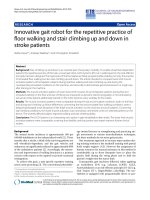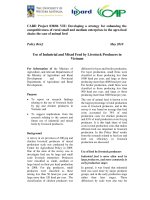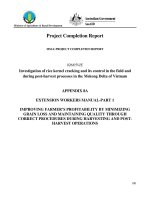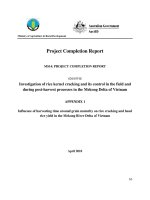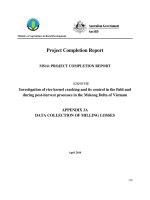Report Practice of Industrial Robots and Sensor
Bạn đang xem bản rút gọn của tài liệu. Xem và tải ngay bản đầy đủ của tài liệu tại đây (2.66 MB, 19 trang )
<span class="text_page_counter">Trang 1</span><div class="page_container" data-page="1">
<b> Ministry of Education and Training</b>
HCMC University of Technology and EducationFaculty of International Education
<b>GROUP 01: </b>
<b>1. Pham Duc Khiem - 211464002. Vu Duc Huy - 211463953.Nguyen Dang Duy– 21146377</b>
<b>4. Li Duy Khang - 21146397</b>
</div><span class="text_page_counter">Trang 2</span><div class="page_container" data-page="2"><b>Table of Contents:</b>
<b>I.Station Overview ……….………..…</b>
<b>4II.List of equipments, Function of the devices………….…….5</b>
2.1.Devices Table……….…….5
<b>III. Devices Wiring Diagram………..…………9</b>
<b>IV. PLC and I/O addresses Table……….10</b>
<b>VI.PLC and HMI Programming of the Station…….……….12</b>
6.1.PLC program with Tia Portal V15……….12
6.2.HMI programming……….………17
<b>VII.Maintenance Schedule for the Station…………..………19</b>
<small>2</small>
</div><span class="text_page_counter">Trang 3</span><div class="page_container" data-page="3"><b>List of Figures:</b>
<i>Fig 1. Glue station overview………...4</i>
<i>Fig 2. PLC S7-1200, CPU 1214C-DC/DC/DC………..…6</i>
<i>Fig 3. SamKool HMI Screen……….6</i>
<i>Fig 4. Proximity Sensor 1,2………..7</i>
<i>Fig 5. Proximity Sensor 3………...8</i>
<i>Fig 6. Main conveyor……….……...8</i>
<i>Fig 7. Cylinder retract……….…………9</i>
<i>Fig 8. Connection Diagram of the Station……….…………10</i>
<i>Fig 9. Control flowchart for the station………..……..11</i>
<i>Fig 10. Hardware Setup for the Station………..……..12</i>
<i>Fig 11.Enter the IP of HMI………..……17</i>
<i>Fig 12. HMI display to control the station………....18</i>
</div><span class="text_page_counter">Trang 4</span><div class="page_container" data-page="4"><b>I. Station Overview </b>
- The third station in the lab is the glue station for the beverage, it consists ofthree conveyors, sensors to detect objects, a cylinder, mechanical system,the HMI screen and a PLC to control the whole station.
- Operational Description : First when we start, the proximity sensor detectsthe bottle from the previous station, then wait for the sensor 2 to detectedthe bottle. If both have signal, the motor will start to run the main conveyorand two sided conveyor belts on until receives the signal of the sensor 3,the conveyor will stop for 750ms. The cylinder extend to controls the pushbar closes the last piece of cardboard of the carton, three others pieces areclosed by mechanical system. Then delay for 100ms, the cylinder retractand the main conveyor on to transport the carton glued by mechanicalsystem and produce the completed product.
<small>4</small>
</div><span class="text_page_counter">Trang 5</span><div class="page_container" data-page="5"><i>Fig 1. Glue station overview</i>
<b>II. List of equipments, Function of the devices</b>
- The experimental station concludes several equipments : Conveyors, thecylinder, sensors, HMI screen, VFD system and PLC.
Speed: About 5m/min
</div><span class="text_page_counter">Trang 6</span><div class="page_container" data-page="6"><b>2.2.Function of the devices </b>
+ PLC S7-1200, CPU 1214C-DC/DC/DC: The main controller to controlsthe whole system in the station.
<i>Fig 2. PLC S7-1200, CPU 1214C-DC/DC/DC</i>
+ Sam Kool HMI screen: To displays the programming HMI and help to controls the system through our PLC program.
<small>6</small>
</div><span class="text_page_counter">Trang 7</span><div class="page_container" data-page="7"><i>Fig 3. SamKool HMI Screen</i>
+ Proximity Sensors: To detect objects and receives signal contribute tocontrol the system.
</div><span class="text_page_counter">Trang 8</span><div class="page_container" data-page="8"><i>Fig 4. Proximity Sensor 1,2</i>
<i>Fig 5. Proximity Sensor 3</i>
+ Conveyors: Run by motors by connecting it to VFD systems, control the speed of conveyors through PLC program.
<small>8</small>
</div><span class="text_page_counter">Trang 9</span><div class="page_container" data-page="9"><i>Fig 6. Main conveyor</i>
+ Cylinder: One of actuators in the system, to controls the push bar closes the last piece of cardboard of the carton.
<i>Fig 7. Cylinder retract.</i>
<b>III. Devices Wiring Diagram </b>
- The connection of the station with PLC and other devices. With 7 inputs( 2 buttons , 5 sensors) and 5 outputs are wired as below :
</div><span class="text_page_counter">Trang 10</span><div class="page_container" data-page="10"><i>Fig 8. Connection Diagram of the Station</i>
<b>IV. PLC and I/O addresses Table</b>
<b>No.Devices/Description InitialStatus</b>
<b>Input/ OutputPLC</b>
12 Inverse 2 sidedconveyor
Q0.4 Output
<b>V. Control Flowchart for the station </b>
<small>10</small>
</div><span class="text_page_counter">Trang 11</span><div class="page_container" data-page="11"><i>Fig 9. Control flowchart for the station. </i>
</div><span class="text_page_counter">Trang 12</span><div class="page_container" data-page="12"><i>Fig 10. Hardware Setup for the Station</i>
- Afterward, to program, navigate to the "Program Blocks" section andproceed to write the desired program in the "Main" block.
- We assign the Start/Stop button to M1.6 and M1.7 variables respectively.
- This two variables control M1.0 is also the variable controls the total logicof the program.
<small>12</small>
</div><span class="text_page_counter">Trang 13</span><div class="page_container" data-page="13">- When input M1.0 is activated, along with the feedback signal from I0.4,and with Timer 1 set to "Timer Off," it will affect output M0.0, whichcontrols the main conveyor, and M0.2, which controls the side conveyors ofthe system. Variables M0.0 and M0.2 use to maintain the signal.
- In the lower branch, when input M1.0 is activated, along with the sensorsignal from I0.4, it triggers a timer to run for 50 seconds until the conveyorstops.
</div><span class="text_page_counter">Trang 14</span><div class="page_container" data-page="14">converter to increase the frequency, ensuring that the time taken to reach thepackaging stage on the side conveyors is the fastest.
- The conveyor runs until the signal from sensor I1.3 is received. After that,Timer 2 is triggered to run for 750ms, and then the main conveyor stops. Atthe same time, the frequency converter is controlled to ensure that the mainmotor and the side conveyor motors run at the same speed range for thenext 11 seconds. Afterward, Timer 4 is interrupted.
<small>14</small>
</div><span class="text_page_counter">Trang 15</span><div class="page_container" data-page="15">- When M1.0 is activated along with T2.Q being counted in the upperbranch, it affects variable M0.3, which controls the downward motion of thecylinder. When the limit switch 1.1 is triggered upon contact, it activatesTimer 3 to count for 100ms. Afterward, it automatically interrupts M0.3 tocontrol the retraction of the cylinder.
- When the retracting cylinder touches the limit switch I1.2, it will affectvariable M0.6, which controls the main conveyor. If there is a signal fromsensor I0.4, M0.6 will be interrupted, and the conveyor will resume runningat the previously set speed.
</div><span class="text_page_counter">Trang 16</span><div class="page_container" data-page="16">- M0.0 and M0.6 are used to control the main conveyor, while variableM1.1 is used to control the manual mode on the HMI
<small>16</small>
</div><span class="text_page_counter">Trang 17</span><div class="page_container" data-page="17">- Variables M0.2 and M0.3 are used to control the side conveyors and thescraping cylinder, respectively. M1.3 and M1.4 are used to control thesystem in manual mode.
- Variable M1.0 is used to prevent signal duplication when inputting speedon the HMI in auto mode.
<b>6.2 HMI programming</b>
- In the step of uploading the project file (TCP/IP), it is necessary to enterthe correct address of the HMI screen in order to establish a connection anddisplay on the screen. After that we save and choose expect path.
<i>Fig 11.Enter the IP of HMI. </i>
- To connect and display on the HMI screen, we establish correspondingconnections between inputs and outputs from Tia Portal for the desiredbuttons, sliders, and icons in the SK Tool software. Below is an image ofour HMI interface:
</div><span class="text_page_counter">Trang 18</span><div class="page_container" data-page="18"><i>Fig 12. HMI display to control the station. </i>
- As we can see on the screen, there are two buttons, "Auto On/Off," to switchbetween the "Auto" and "Manual" modes. There is also a "Reset" button toreset all actuators to their initial state.
- The speed control slider allows manual input of values on the screen from 0to 27700. Additionally, there are two limit switches, S1 and S2, for the cylinderlight.
- The manual control buttons below allow manual control of the main conveyorand its direction, the side conveyors, and the push cylinder. They also indicatethe status of the sensors by illuminating the corresponding lights.
<small>18</small>
</div><span class="text_page_counter">Trang 19</span><div class="page_container" data-page="19"><b>VII. Maintenance Schedule for the Station </b>
<b>NoDevicesMaintenance Period Tasks </b>
1 Main Conveyor
About 1000 hours
Clean, Lubricate, BeltInspection andreplacement
</div>

